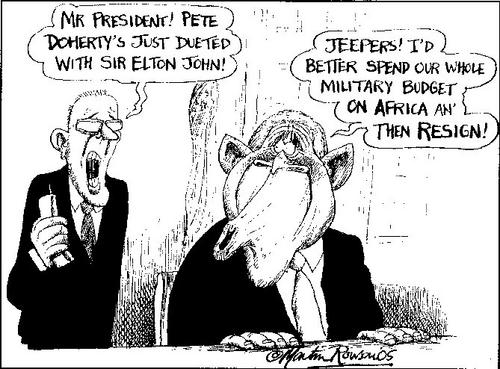What if they had a protest and everyone came?
Mon. July 4, 2005Categories: Abstract Dynamics
What kind of protest is it that everyone agrees with?
If you weren’t already suspicious of the dull unanamity that coalesced on Saturday, reflect on the fact that the Russian show only happened because Putin didn’t want to be the only G8 leader whose country did not have a Live 8 gig. That fact alone reveals that the relationship between the current ruling elite and their ostensible opponents in the entertainment biz goes far beyond complicity.
Live 8 rests on two ‘libidinal fallacies’.
The first is obvious: it ignores the systemic and abstract nature of the geopolitical situation. It really isn’t the case that ‘eight men in a room’ can ‘change history’ simply by an act of will. Beyond the sentimental bluster, everyone knows that, but Live 8 depends upon a fantasy that there are two types of subject who need to be enlightened: the Subject Who Does Not Know (and whose ‘awareness’ is to be raised) and the Subject Who Knows but Who Doesn’t Care. But who are these people? Who, exactly, needs to be ‘made aware’ of the fact that Africa is desperately poor? And does anyone, even those who buy into the cheap off-the-shelf caricature of Bush as a dumb chimp, really think that he, personally, deliberately chooses to inflict starvation on African children? More to the point, does anyone really think that, on the level of personal morality, Bush is any different from the billionaire Pop Stars so histrionically raising their fists against him and wagging their fingers at us? That is to say: if there is some sort of moral dividing line, would you really want to place Bush on one side and Elton John and $ Bill Gates on the other?

It is not that Live 8 is a ‘degraded’ form of protest. On the contrary, it in Live 8 that the logic of the Protest is revealed in its purest form. The Protest impulse of the 60s posited a Malevolent Father, the harbinger of a Reality Principle that (supposedly) cruelly and arbitrarily denies the ‘right’ to total enjoyment. This Father has unlimited access to resources, but he selfishly – and senselessly – hoards them. Yet it is not capitalism but Protest itself which depends upon this figuration of the Father. It goes without saying that the psychological origins of this imagery lie in the earliest phases of infancy. The hippies’ bucolic imagery and ‘dirty Protest’ – filth as a rejection of adult grooming – both originate in the ‘unlimited demands’ of the infant. A consequence of the infant’s belief in the Father’s omnipotence is the conviction that all suffering could be eliminated if only the Father wished it. (In terms of Live 8: if only those 8 men yield to our demands, all poverty could be eliminated forever!) The demand for total enjoyment is actually pretty indiscriminate: the Protest could just easily be against war (bummer maaaan) or against being charged for going into a festival (hey, breadheadzzzzzzz, don’t be heaveeeee….)
Indidentally, one of the successes of the latest global elite – the Social Democrats – has been their avoidance of identification with the figure of the hoarding Father, even though the ‘reality’ they impose on the young is substantially harsher than the ‘reality’ they protested against in the 60s. In this sense, Bush is a godsend for Blair, since Blair can pose as the ‘really realistic’ representative of Social Democratic moderation ‘winning concessions’ from the obscene excesses of Bush, the Junkyard King of Amerikapital’s hideous fusion of id and superego. (The reference to the Birthday Party is not idle here. Oddly, their Junkyard strikes me as an uncannily prescient psychoanalysis both of Bushite Amerika and the role that it plays in everyone else’s fantasies, ‘Big-Jesus-Oil-King down in Texas drives great holy tanks of Gold/ screams from heaven’s Graveyard/ american heads will roll in Texas/ roll llike daddy’s meat…’)

This brings us to the second fallacy. What is being disavowed in the abjection of evil and ignorance onto fantasmatic Others is our own complicity in planetary networks of oppression. What needs to be kept in mind is BOTH that capitalism is a hyper-abstract impersonal structure AND that it would be nothing without our co-operation. As I will never tire of insisting, the most Gothic description of Capital is also the most literal. Capital is an abstract parasite, an insatiable vampire and zombie-maker; but the living flesh it converts into dead labour is ours, and the zombies it makes are us. Determinists of both a neo-liberal and anti-humanist bent (believe it or not, it is not unheard of for such positions to co-incide within the same person, proving that Marx wasn’t wrong about the essentially contradictory nature of capitalist ideology) merely echo teleo-Marxism at its most eschatological when they insist that what the meat (or human) components of the Capital machine are of no consequence since the total triumph of Capital is historically Inevitable.
The question of what Capital wants from us requires answers at a number of levels: economic, psychonalytic, and perhaps most pressingly, theological. In any case, it is clear that, for the moment at least, Capital cannot get along without us. It remains the case, however, that we can get along without it. The parasite needs its ‘mere conscious linkages’ but we do not need the parasite. In addition to anything else, to ignore the crucial functioning of the meat in the machine is poor cybernetics. The denial of human agency is an SF fantasy, albeit one that is everywhere realising itself.
But to reclaim that agency means first of all accepting our insertion at the level of desire in the remorseless meat-grinder of Capital. Capital is not something imposed upon us by Bush; it is we who are hooked on the ‘garbage in honey’s sack’, unable to kick the habit of returning to the Big Jesus Trashcan for another hit of feel-good junk.
It also means raising the price – libidinal, personal, monetary – of agency. The repeated claim from onstage multi-millionaires that the audience were going to ‘change history’ simply by turning up and tuning in cheapens agency in every sense. Participating in a narcissistic, self-rigtheous Spectacle is not ‘doing something’. Tony Parsons, of all people, made the very good point in The Mirror today that the generation of the Thirties and Forties did not expect Crosby and Sinatra to change the world – but, as he says, many of them had either risked or given up their lives to change things.
Withdrawal from the Capital Matrix entails an unplugging that will seem painful to nervous systems commensurated to the Reality-Pleasure Principle. Partly it means giving up the reassuring comforter of the Bad Father Figure and facing the fact that the G8 leaders are not capable of legislating away all planetary misery, but are ‘old men at the crossroads’, Capital’s meat puppets not its masters. There is a sense in which it simply is the case that the political elite are our servants; the miserable service they provide from us is to launder our libidos, to oblgingly re-present for us our disavowed desires as if they had nothing to do with us. If anyone is in charge in Kapital it is Oedipus Rex, i.e. us. (‘I yam the King!’ as Cave caterwauled on ‘Junkyard’. Yes: the junkie as monarch, that’s capitalist sovereignty.) The political ‘reality’ that Bush and the others will no doubt blame their failure to act upon is not just an ideological smokescreen. It is the reality constituted by the desires of that selfsame Live 8 crowd who, when push comes to shove, will not pay extra taxes, will not give up cheap flights or car use, will not make a stand against inequity and stupidity at work if it means compromising their interests and those of their famileeeee and yet who expect global crises to be magically solved by 8 stooges in a room.
The great benefit of Lacanianism is to reject both the party of the Infant (‘you want new masters, and you shall have your wish’ as Lacan told the student protestors of the 60s) and the party of the Father (the empircomongers who try to sell the Symbolic as the only Real). There must indeed be a demand for the Impossible, but an Impossible which does not correspond with the definition provided by either party. It is not a question of total enjoyment, but of the not-all, a sober psychosis, lessness….
[…] https://k-punk.org/what-if-they-had-a-protest-and-everyone-came/ […]
[…] What is meant by this is that a true accelerationist wants to affirm capitalism’s own outward-facing orientation — and this orientation is a central insight of Karl Marx. The desire that fuels a capitalist system is insatiable but, in constantly reaching beyond itself, it also puts itself at risk. It threatens its own destruction every time it attempts to assimilate a new outside. In that sense, capitalism does not refer to some state of things outside ourselves. Capitalism is nothing without us — that is, our desires — and so, as an aside, I want to be clear here, when I say capitalism in this talk, know this refers to the entire system, from the oppressive forces of the state and the economic systems that escape its boundaries, but also ourselves and our internalised sense of our bordered constitution. Capital and subject are, in this way, horrific mirrors of each other. To quote Mark Fisher again: […]
[…] To conclude, Pokemon Go is the pre-simulation that reproduces the reality, it produces the virtual as much as the real; it crowd controls, it coordinates. Computing human parameters in a simulation becomes a redundancy if the game itself can directly compute and simulate human beings in the physical world. The question is, what is it simulating? Just like Mark Fisher forestalled back in 2008 in his book ‘Capitalist Realism’ before he took his own life: what if you held a protest and everyone came? […]
[…] about a general strike in support of Palestine, taking place for many tomorrow. It reminded me of that excellent k-punk post on Live 8 — the sycophantic spectacle from what feels like another universe where some people really […]